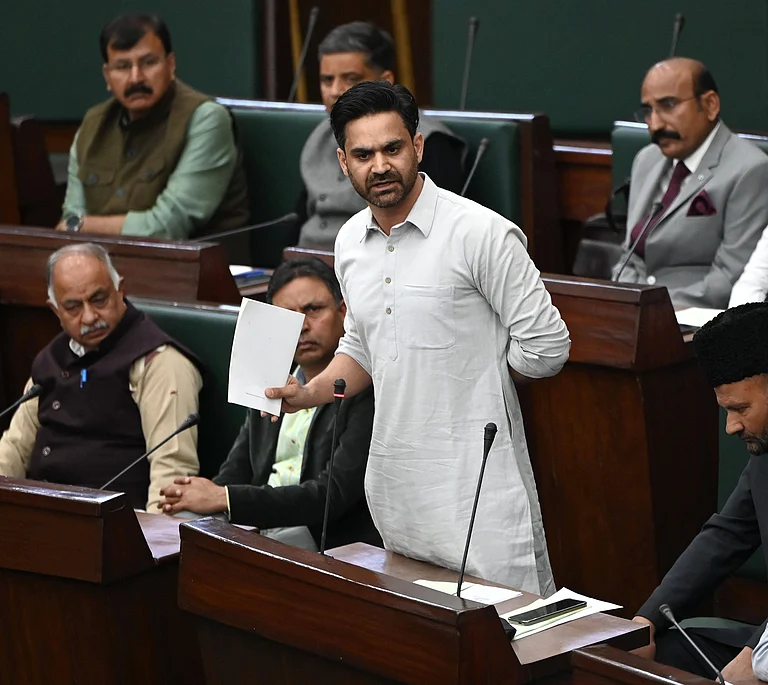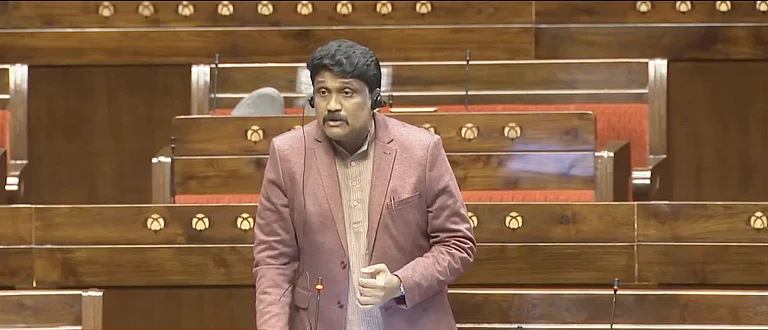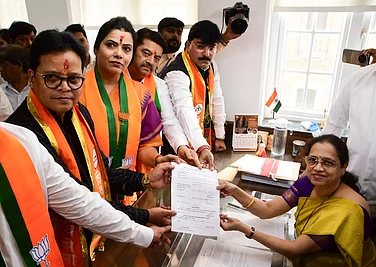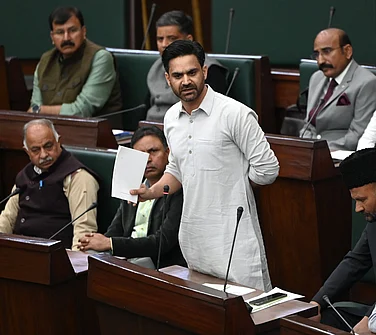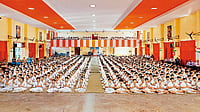At a political rally in Patna’s iconic Gandhi Maidan last week, Ram Vilas Paswan was a touch more than effusive in praising Prime Minister Narendra Modi. “Earlier, we used to say that his chest is of 56 inches. But, today, Gandhi Maidan is honouring you by saying Narendra Modi’s chest size is not 56 inches, but 156 inches.” Held in the backdrop of India’s dramatic airstrikes in PoK, and the breathless media coverage of it, the rally was naturally dyed in those colours. With just weeks left for a general election, the political scenario has been irrevocably given a ‘nationalistic’ turn. And Paswan, a wily veteran known as the best hand at spotting which way the wind is blowing, had already hitched his wagon to what he deemed the rising star. So dramatically articulating a theme that the ruling National Democratic Alliance (NDA) will make its war cry for 2019 makes sense for him. Given the strong sentiments the theme can evoke, whatever else happens, ‘nationalism’ is not about to disappear from the narrative.
And that’s bad news for Opposition parties, still struggling to find common ground for a possible alliance—or set of alliances—to take on Modi and a rejuvenated BJP. There may be doubts over the efficacy of the airstrike at the JeM camp, but there’s really no doubt that among its casualties, at least in the immediate term, is the Opposition. The ‘nationalistic’ rush has knocked it off its feet when it was just finding its feet, and its best-laid, if tentative, plans have been put to waste, at least for now. Political analysts agree. “I’ve no doubt that, post Balakot, the BJP will benefit electorally. At the moment, people believe that PM Modi taught a lesson to Pakistan and only Modi can do it,” Sanjay Kumar of the Centre for Study of Developing Societies (CSDS) tells Outlook.
Psephologist-turned-political activist Yogendra Yadav too says its vast reach on social media allows the BJP to exploit the situation to its advantage. “The Balakot strike is being used to change the narrative in an unprecedented way. The 1971 war was followed by the 1972 elections, but it wasn’t crude like now. Kargil was followed by the 1999 elections but not like this. What we are witnessing is nothing short of a hijacking of a national general election,” says Yadav.
Congress leaders admit that they need to recalibrate their alliances and take a fresh look at things. “The Opposition will have to revise its strategies to match the BJP’s changing goalposts. There’s a consolidation of parties,” says senior Congress leader Tom Vadakkan. The immediate strategic objective, of course, will be to deflect public conversations back to the Modi government’s “failure” in the socio-economic sphere. “Our election campaign will be on unemployment, the farmer crisis, Rafale, inflation, black money and other pressing issues,” says Vadakkan.
If that’s going to be difficult, trying to clean up the mess on the coalition-making front is no less daunting. ‘Opposition unity’ seemed a fragile idea after talks between Congress and Aam Admi Party floundered again, thanks to the former’s uncompromising stand on seat-sharing. With AAP already announcing six candidates out of the seven Lok Sabha seats in the state, even hopes of a last-minute thaw seemed to evaporate.
But even as the BJP basks in the euphoria after the airstrike, Congress leaders are at pains to point out that this isn’t the first time India has seen military success, that the country fought two of its most successful wars—in 1965 and 1971—under Congress governments. “Amit Shah says ‘this is a new India and not the old India’. He forgets that India has fought four wars before. We even divided Pakistan to get a new country in 1971. But Indira Gandhi never used it for political benefits,” says party spokesperson Shama Mohamed.
Some analysts also cast doubt on whether electoral gains necessarily follow a military success, and cite voting patterns after the Kargil conflict in 1999 and the 2016 surgical strikes. The two-month-long Kargil war was fought under the BJP-led Vajpayee government, followed by Lok Sabha elections in October. While the BJP did return to power, its seat share remained the same as in 1998. Analysts also say the surgical strike of 2016 didn’t benefit the BJP much in the assembly elections in Uttar Pradesh, Punjab and Uttarakhand.
Though war clouds are dissipating on the western front, the enthusiasm in the BJP camp is palpable in rallies led by Modi. With its new catchphrase, ‘Modi Hai Toh Mumkin Hai’ (It’s possible with Modi at the helm), the saffron party is going all out to project the PM’s decisive leadership. And the shift in the political narrative is helping it consolidate its alliance too. Despite playing hardball with the BJP, its oldest allies—Shiv Sena and Akali Dal—have mellowed after the strike. The shift was especially striking in the case of the Shiv Sena, which had been attacking Modi and the BJP over the last few months. The parties sealed ties with the BJP in Maharashtra and Punjab respectively after the Pulwama terror strike. Though BJP had to bend backward to accommodate the demands of its allies, including Ram Vilas Paswan’s Lok Janshakti Party (LJP) in Bihar, the post-Pulwama scenario has changed the equation in a favourable way for them.
Also, small parties in politically crucial Uttar Pradesh, like the Apna Dal and Suheldev Bharatiya Samaj Party (SBSP), which had rebelled earlier, seem to have got behind the BJP. Apna Dal, which holds two Lok Sabha seats in UP, had earlier accused the BJP of not taking care of its allies. However, Apna Dal (S) chief Ashish Singh Patel says he is hopeful of the central leadership conceding to their demands. “Our meeting with party president Amit Shah was positive and our issues will be sorted out soon,” says Patel.
And in Tamil Nadu, the alliance with the AIADMK and PMK has given much-needed heft to the BJP. After sealing the alliance, Modi addressed two meetings in Tamil Nadu to exhibit the new-found bonhomie with the AIADMK leadership. The Abhinandan angle has come in handy to counter the narrative of BJP’s image as an anti-Tamil party.
Next door, in the two states formed after the division of Andhra Pradesh, the Telangana Rashtra Samiti (TRS) and Jaganmohan Reddy’s YSRCP can potentially turn the tide in an evolving political scenario. But will Balakot resonate in the Deccan? “It will have no bearing on the Andhra voter,” feels senior YSRCP leader Ambati Rambabu. People are angry with Modi for going back on his promise to grant ‘special status’ to Andhra Pradesh, he says. A final word on their inclinations can be only said post-poll, though.
Forced onto the backfoot, Opposition parties are struggling not only in their attempt to bring economic issues back into focus to counter the BJP narrative. They are floundering in their bid to find a viable way to deny BJP the glory and halo of a ‘heroic’ cross-LoC strike. For, any question they raise invites charges of politicisation. “The BJP government is committed to national security and protecting citizens against terrorism. It’s unfortunate anyone can even doubt the decision to give a free hand to the army and air force. It’s condemnable,” says BJP leader Nalin Kohli.
Worn down by mutual distrust in their alliance-making and bereft of the rhetorical advantage, the Opposition faces an unenviable task—only a united front can even try to meet the challenge. “At the moment, grand alliance is an idea, not a reality. A proper grand alliance is the need of the hour. More than that, the Opposition has to devise a new narrative,” says Yadav. One sign of consolidation emerged last week as the CPI(M) extended the olive branch to the Congress in West Bengal. Too little...?
***
- The NDA’s war cry for the 2019 general elections has been sounded: nationalism and national security
- Opposition parties are forced on the backfoot after the BJP targeted them for “politicising” the Balakot airstrike
By Preetha Nair with inputs from G.S. Shekhar in Chennai and M.S. Shanker in Hyderabad







